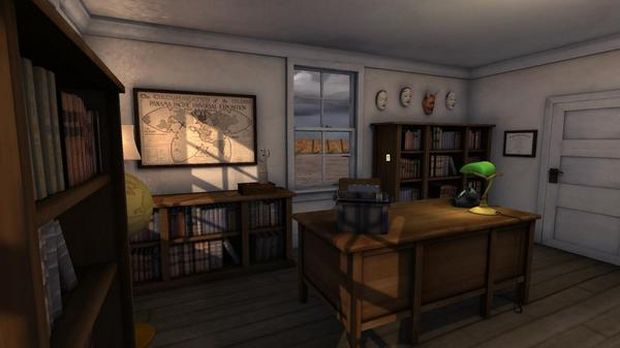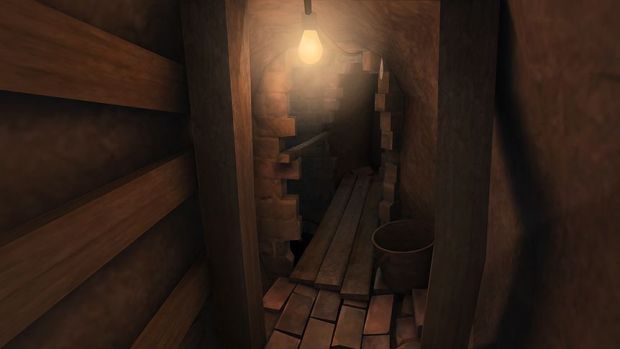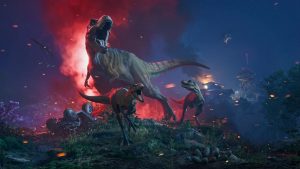
There are many intriguing virtual reality titles coming to PlayStation VR (which you probably wouldn’t have guessed if you attended Sony’s dismal VR showing at the PlayStation Experience) and Robot Invader’s Dead Secret. This murder mystery puts you in the shoes of a detective investigating the murder of Harris Bullard and as you learn more, you come one step closer to preventing your own demise. Dead Secret is already available for Samsung Gear VR but it will also be available for Oculus Rift and PlayStation VR. Interestingly, it will also be coming to Steam and PS4 in the future.
GamingBolt had a chance to speak to Robot Invader’s Chriss Pruett about Dead Secret, what inspired the decision to bring the game to PlayStation VR, gameplay elements and his thoughts on the overall future of VR.
"All of the original controller-based gameplay code still lives in Dead Secret. As we rebuilt it for VR the TV-based play systems have remained intact (in fact, we showed it running both on a TV and in VR at PAX East this year)."
Can you tell us about the development process for Dead Secret? What inspired you to also develop for PlayStation VR?
Chris Pruett: Dead Secret began its life as a TV / tablet game way back in 2013. Though we built a compelling prototype, we weren’t sure what to do with it. There wasn’t much of a market for narrative-heavy tablet games, Greenlight made Steam look pretty scary, and the PS4 hadn’t launched yet. We put the project on the shelf and went to work on another title (Wind-up Knight 2, the sequel to our studio’s hit platformer). When that game shipped in the spring of 2014 we started noodling with Dead Secret again. At the same time we got our hands on an early Gear VR development kit and had our first Oculus DK2 experience, which was staggering. It was clear that Dead Secret was a natural fit for VR, so we tore the project apart and sewed it back together again as a VR game.
Could you tell us about the console roots that Dead Secret still remains faithful to? How did this affect the process of developing for VR and the gameplay differences that will be present in the PS3/PS4 versions?
Chris Pruett: All of the original controller-based gameplay code still lives in Dead Secret. As we rebuilt it for VR the TV-based play systems have remained intact (in fact, we showed it running both on a TV and in VR at PAX East this year). However, the transition to VR caused a dramatic change to the user interface. We removed all of the two-dimensional elements from the game: the HUD, traditional subtitles, even the main menu. Everything was rebuilt to work in 3D space.
Patricia’s thoughts and commentary now appear tacked onto the surfaces that she is looking at. The HUD is gone and only a context-sensitive reticle remains. Documents, which once appeared as simple text overlays, are now carefully-rendered pages in Patricia’s notebook. When you look down, you see her body. These changes were all requirements for VR, but we were surprised by how much better they made the traditional version of well. VR forced us to streamline our interface, and the console version of Dead Secret was dramatically improved in the process.
Dead Secret has looked upon games like Siren, Deadly Premonition and Clock Tower for its influences. What are thoughts on the current contemporary state of horror, especially with each game seemingly being the “new P.T.”?
Chris Pruett: This is a pretty good time to be a horror gamer. The golden age of console horror design was in the late 1990s and early 2000s, when scary games were on the forefront of story-driven game design. Many of the narrative systems we find in all sorts of genres today were established by horror games during that time. I think that era ended in 2004 with the release of Resident Evil 4,which single-handedly disrupted several major game genres and made earlier horror titles look dated. After that there was quite a slump. The number of releases dwindled and there are only a few titles from that period that have proved influential. I think we can safely credit the end of that downturn with the release of Amnesia: The Dark Descent in 2010.
The success of Amnesia showed that games made by relatively small teams could reach significant success by focusing on the things that horror has always been good at: story, environment, and subtlety. There were several other post-Amnesia success stories (Slender and Five Nights at Freddy’s come to mind, though there are others), also made by small, independent studios. As the indie development scene has grown, horror has experienced a major comeback. These days you can fire up Steam or turn on your PlayStation and find a wide selection of horror games, from brutal gore-fests to psychological mind-benders. As students of horror design, there’s a lot for us to be excited about.
"VR in general is very difficult to get right from a game play perspective. Many of the common game design patterns used for years on console and PC games simply do not apply to VR."
What gameplay aspects of Dead Secret will players have to become used to in order to find Harris Bullard’s killer?
Chris Pruett: Gameplay in Dead Secret is straightforward. You explore the environment by moving your reticle (using the analog stick or, in VR, by simply looking around) over areas to investigate and selecting them. Dead Secret is about exploring the crime scene for clues at your own pace. Peek in the cupboards, look under the sofa cushions, and examine the names of the book on the shelf. To name Harris Bullard’s killer Patricia will need to accumulate enough evidence to reconstruct his bizarre past and piece together the events that led to his murder. But don’t get comfortable—Bullard’s killer is still on the loose, and if he catches up to Patricia she’s done for. At points you’ll need to make split-second decisions to escape a grisly death.
What unique challenges did you face when developing for PlayStation VR?
Chris Pruett: VR in general is very difficult to get right from a game play perspective. Many of the common game design patterns used for years on console and PC games simply do not apply to VR. We mentioned the HUD and user interface above, but there are many other areas that are similarly affected. Creating a comfortable motion system, for example, is very hard. Our approach to locomotion is designed around the basic properties of the human vestibular system, and we did a whole lot of user testing to make sure we’d gotten it right. There are many areas like this that we take for granted when playing on a TV that must be completely rethought for VR.
Will Dead Secret release on any other VR platform in the near future, especially if devices like Oculus Rift prove their success?
Chris Pruett: Yes. Dead Secret is available on the Gear VR today, and we have announced it for the Oculus Rift as well.
There are many unique exploration titles, particularly in the first person mode, which will be releasing for the VR platform next year. What makes Dead Secret unique and how will it stand out in the crowded market?
Chris Pruett: Our focus is on the three traits of horror games I named above: story, environment, and subtlety. Our goal has been to achieve “presence” in VR—the feeling that you are really there in the crime scene. We’ve put a huge amount of detail into the story and environment. For example, every room in Dead Secret has a unique soundscape designed just for that room. We’ve also put a lot of work into making the experience a comfortable one.
The movement system I alluded to above took us the better part of a year to get right, but it allows just about everybody to move about the house in first person without experiencing motion sickness. Finally, I think that these sorts of games are defined by the narrative that they provide rather than the viewpoint of their camera. As far as the market for creepy murder mysteries that take place in rural Kansas in 1965 go, we’re pretty confident.
What are your thoughts on the overall potential for VR in the long run?
Chris Pruett: We think it will represent a new medium, a brand-new way to experience software unlike anything that we’ve had up until now. It won’t happen overnight, but this technology will change the way we work with computers, and the way we communicate with each other using computers.

"As game design connoisseurs, proper PS2 emulation is a big deal to us. A huge chunk of the golden age of horror games mentioned above ran on the PS2, and many of those games are absolutely worth playing."
Do you believe that the overall price and investment required for VR could hinder it or at least limit its outreach to the general populace?
Chris Pruett: No. Once you’ve tried one of the contemporary VR devices out there, the potential is immediately apparent. It’s almost impossible to describe the feeling of being in a virtual space to somebody who hasn’t tried it. As folks bring these devices into their homes I think you’ll see adoption pick up pretty quickly.
Is the game going to run at 60fps and 1080p on the PS4?
Chris Pruett: The PS4 version of Dead Secret is still in development, so I can’t comment yet.
Is there a specific reason why the game is not coming on the Xbox One?
Chris Pruett: We’d love to do an Xbox One version!
As a developer and a gamer, what are your thoughts on the recent announcement by Sony for PS2 emulation on PS4? Do you think it holds value especially given that a number of games are due for the next year and beyond?
Chris Pruett: As game design connoisseurs, proper PS2 emulation is a big deal to us. A huge chunk of the golden age of horror games mentioned above ran on the PS2, and many of those games are absolutely worth playing. There are many titles on that platform that could not be made today simply because they are beyond the means of most independent studios but too niche for a large publisher to consider. It’s a catalog of thousands of games.
Did you see the HoloLens demonstration at E3 this year. What are your thoughts on Hololens?
Chris Pruett: It’s too early to tell! But I think that it’s likely to be targeted at enterprise rather than games, at least at first.
Will Dead Secret be your only title for VR or are there any other ideas in the pipeline?
Chris Pruett: We’re already hard at work on a new VR title. Stay tuned!
















